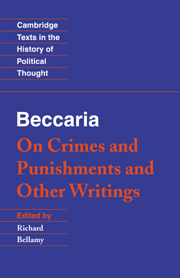Book contents
- Frontmatter
- Contents
- Acknowledgements
- Introduction
- Chronology
- Biographical glossary
- Note on the texts
- Bibliographical note
- On Crimes and Punishments
- Frontispiece
- To the Reader
- Introduction
- 1 The origin of punishment
- 2 The right to punish
- 3 Consequences
- 4 The interpretation of the laws
- 5 The obscurity of the laws
- 6 The proportion between crimes and punishments
- 7 Errors in the measuring of punishments
- 8 The classification of crimes
- 9 Of honour
- 10 Of duels
- 11 Public peace
- 12 The purpose of punishment
- 13 Of witnesses
- 14 Evidence and forms of judgement
- 15 Secret denunciations
- 16 Of torture
- 17 Of the exchequer
- 18 Of oaths
- 19 Of prompt punishments
- 20 Violent crimes
- 21 The punishment of the nobility
- 22 Theft
- 23 Public disgrace
- 24 Parasites
- 25 Banishment and confiscations
- 26 Family feeling
- 27 Lenience in punishing
- 28 The death penalty
- 29 Of detention awaiting trial
- 30 Trials and prescriptions
- 31 Crimes difficult to prove
- 32 Suicide
- 33 Smuggling
- 34 Of debtors
- 35 Asylums
- 36 On setting a price on men's heads
- 37 Attempted crimes, accomplices and immunity
- 38 Leading interrogations, depositions
- 39 Of a particular kind of crime
- 40 False ideas of utility
- 41 How to prevent crimes
- 42 The sciences
- 43 Magistrates
- 44 Public awards
- 45 Education
- 46 Pardons
- 47 Conclusion
- To Jean Baptiste d'Alembert
- To André Morellet
- Inaugural Lecture
- Reflections on the Barbarousness and the Civilisation of Nations and on the Savage State of Man
- Reflections on Manners and Customs
- On Luxury
- Index
- Cambridge Texts in the History of Political Thought
16 - Of torture
Published online by Cambridge University Press: 05 June 2012
- Frontmatter
- Contents
- Acknowledgements
- Introduction
- Chronology
- Biographical glossary
- Note on the texts
- Bibliographical note
- On Crimes and Punishments
- Frontispiece
- To the Reader
- Introduction
- 1 The origin of punishment
- 2 The right to punish
- 3 Consequences
- 4 The interpretation of the laws
- 5 The obscurity of the laws
- 6 The proportion between crimes and punishments
- 7 Errors in the measuring of punishments
- 8 The classification of crimes
- 9 Of honour
- 10 Of duels
- 11 Public peace
- 12 The purpose of punishment
- 13 Of witnesses
- 14 Evidence and forms of judgement
- 15 Secret denunciations
- 16 Of torture
- 17 Of the exchequer
- 18 Of oaths
- 19 Of prompt punishments
- 20 Violent crimes
- 21 The punishment of the nobility
- 22 Theft
- 23 Public disgrace
- 24 Parasites
- 25 Banishment and confiscations
- 26 Family feeling
- 27 Lenience in punishing
- 28 The death penalty
- 29 Of detention awaiting trial
- 30 Trials and prescriptions
- 31 Crimes difficult to prove
- 32 Suicide
- 33 Smuggling
- 34 Of debtors
- 35 Asylums
- 36 On setting a price on men's heads
- 37 Attempted crimes, accomplices and immunity
- 38 Leading interrogations, depositions
- 39 Of a particular kind of crime
- 40 False ideas of utility
- 41 How to prevent crimes
- 42 The sciences
- 43 Magistrates
- 44 Public awards
- 45 Education
- 46 Pardons
- 47 Conclusion
- To Jean Baptiste d'Alembert
- To André Morellet
- Inaugural Lecture
- Reflections on the Barbarousness and the Civilisation of Nations and on the Savage State of Man
- Reflections on Manners and Customs
- On Luxury
- Index
- Cambridge Texts in the History of Political Thought
Summary
The torture of a criminal while his trial is being put together is a cruelty accepted by most nations, whether to compel him to confess a crime, to exploit the contradictions he runs into, to uncover his accomplices, to carry out some mysterious and incomprehensible metaphysical purging of his infamy, {or, lastly, to expose other crimes of which he is guilty but with which he has not been charged}.
No man may be called guilty before the judge has reached his verdict; nor may society withdraw its protection from him until it has been determined that he has broken the terms of the compact by which that protection was extended to him. By what right, then, except that of force, does the judge have the authority to inflict punishment on a citizen while there is doubt about whether he is guilty or innocent? This dilemma is not a novelty: either the crime is certain or it is not; if it is certain, then no other punishment is called for than what is established by law and other torments are superfluous because the criminal's confession is superfluous; if it is. not certain, then an innocent man should not be made to suffer, because, in law, such a man's crimes have not been proven.
- Type
- Chapter
- Information
- Beccaria: 'On Crimes and Punishments' and Other Writings , pp. 39 - 44Publisher: Cambridge University PressPrint publication year: 1995

